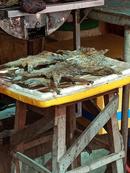Zoonotic Betacoronaviruses - ZooCov
Last update: 23 November 2020
Funding : National French Agency for Research (ANR)/ Occitanie Region/ Pasteur Foundation Asia
Starting date and duration : April 2020 (18 months)
Context
Naturally hosted in wild animals such as bats, betacoronaviruses (beta-CoVs) are responsible for severe and fatal human respiratory infections. Data and knowledge on animal reservoir, but also knowledge on cultural, sociological and ecological factors driving beta-CoVs spread to humans and emergence are limited. In Cambodia, live animal markets represents a major supply of wild animal products, and wild meat consumption is prevalent.
Objective
The main objective of ZooCov is to provide new insights on wild meat trade chains in Cambodia, document the diversity of beta-CoVs circulating through these chains, and develop a flexible and integrated early-detection system of viral spill-over events.
Activities
To achieve this goal, we will build on existing and on-going projects in Cambodia and in Africa, and implement 4 inter-connected workpackages with dedicated sociological, epidemiological and virological surveys in two provinces of Cambodia, ie Mondolkiri and Stung Treng provinces. First, we will analyse the wild meat value chains characteristics through direct observations and dedicated questionnaires. Then, an in-depth analysis of practices, contact rates and perception of the risk associated with wild animal handling and wild meat consumption will be performed through these chains, using qualitative and quantitative approaches. Animal and exposed and non-exposed human samples will be collected at each node of these chains. Retrospective bat samples from Southeast Asia and samples collected in the frame of this project will be analysed by a semi-nested, pan-coronaviridae assay. Any positive samples will be sequenced for confirmation and determination of type of coronavirus. Serological assay will be used to detect antibodies against beta-CoVs in human samples, and document any undetected possible spillover of CoV from animals to humans. Predictors of exposure –practices, species, location.., will be identified using ad hoc statistical models. We will then use the results of these surveys and participatory modelling tools to co-design with all the trade stakeholders an improved and adapted version of the existing wildlife health surveillance system for Cambodia focusing on the detection of beta-CoVs.
Partners
Institut Pasteur du Cambodge ; IRD ; Hong Kong University ; Flora and Fauna International ; Wildlife Conservation Society (Regional Office Vietnam and Cambodia)
Last update: 23 November 2020



